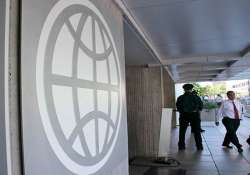World Bank approves new aid for Myanmar
Washington, Nov 2, 2012: Myanmar is moving at "warp speed" in opening up after years of authoritarian rule but needs to build institutions to improve transparency and economic governance, the World Bank said on Thursday

Washington, Nov 2, 2012: Myanmar is moving at "warp speed" in opening up after years of authoritarian rule but needs to build institutions to improve transparency and economic governance, the World Bank said on Thursday as it approved $80 million in development aid.
Pamela Cox, the bank's vice president for East Asia and the Pacific, said the bank has a further $165 million in loan assistance committed for Myanmar after it clears its $900 million in arrears to the World Bank and Asian Development Bank. Japan is helping that process, expected to be completed by January.
The World Bank is re-engaging with the country also known as Burma after a gap of two decades as its government undertakes economic and political reforms, shifting from five decades of ruinous military rule that left it one of Asia's poorest nations.
The bank opened an office in the main city Yangon in August, and its board of directors on Thursday approved a strategy for the next 18 months, providing technical assistance and advice to Myanmar's government on management of public finances, regulatory reform and private sector development.
"This is a government moving at warp speed in terms of opening up," Cox told reporters. She said that in its strategy, the bank was focusing on helping build the public systems needed to foster transparency. She also stressed the need for Myanmar's people to quickly see the benefits of the reform process.
The current average annual income in Myanmar is estimated at between $600 and $800, with a quarter of the population living in poverty. Myanmar ranked third from bottom of 182 nations in the nongovernment group Transparency International's corruption perceptions index for 2011. The reformist government of president and former junta member Thein Sein has taken some steps toward openness on economic policy, including the publication of its budget this year, which in the past had been kept under wraps.
Activists remain concerned that as international economic sanctions on aid, trade and investment are eased, the military and its cronies will be first to benefit from the influx of foreign funds.
The bank approved Thursday an $80 million project to provide $25,000 grants to villages in 15 townships across the country, where community councils will identify the kind of help they want, such as roads, bridges, irrigation systems, schools, health clinics or rural markets.
Last month, President Barack Obama lifted the US restriction on international financial institutions like the World Bank lending to Myanmar after Congress passed legislation enabling that step. It was the latest in a series of steps by Washington to reward the country for its democratic reforms.
Pamela Cox, the bank's vice president for East Asia and the Pacific, said the bank has a further $165 million in loan assistance committed for Myanmar after it clears its $900 million in arrears to the World Bank and Asian Development Bank. Japan is helping that process, expected to be completed by January.
The World Bank is re-engaging with the country also known as Burma after a gap of two decades as its government undertakes economic and political reforms, shifting from five decades of ruinous military rule that left it one of Asia's poorest nations.
The bank opened an office in the main city Yangon in August, and its board of directors on Thursday approved a strategy for the next 18 months, providing technical assistance and advice to Myanmar's government on management of public finances, regulatory reform and private sector development.
"This is a government moving at warp speed in terms of opening up," Cox told reporters. She said that in its strategy, the bank was focusing on helping build the public systems needed to foster transparency. She also stressed the need for Myanmar's people to quickly see the benefits of the reform process.
The current average annual income in Myanmar is estimated at between $600 and $800, with a quarter of the population living in poverty. Myanmar ranked third from bottom of 182 nations in the nongovernment group Transparency International's corruption perceptions index for 2011. The reformist government of president and former junta member Thein Sein has taken some steps toward openness on economic policy, including the publication of its budget this year, which in the past had been kept under wraps.
Activists remain concerned that as international economic sanctions on aid, trade and investment are eased, the military and its cronies will be first to benefit from the influx of foreign funds.
The bank approved Thursday an $80 million project to provide $25,000 grants to villages in 15 townships across the country, where community councils will identify the kind of help they want, such as roads, bridges, irrigation systems, schools, health clinics or rural markets.
Last month, President Barack Obama lifted the US restriction on international financial institutions like the World Bank lending to Myanmar after Congress passed legislation enabling that step. It was the latest in a series of steps by Washington to reward the country for its democratic reforms.